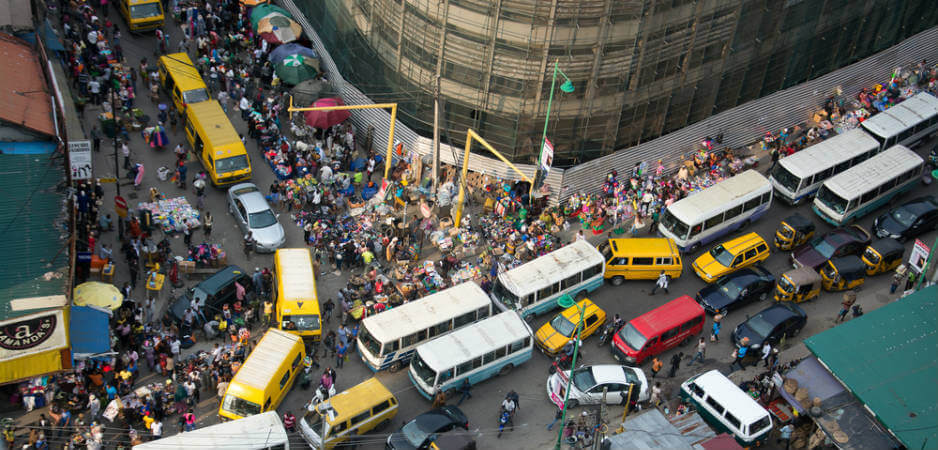Nigeria’s bad roads are responsible for a disproportionate amount of deaths across Africa.
In Lagos, the potholes I encounter every day are scary. Far too scary for anyone to ignore, and yet the government turns a blind eye to a problem that, according to official statistics, kills on average 15 Nigerians a day and over 5,000 a year.
Living in a part of Lagos known as the Mainland, I am constantly perturbed at how Nigerians carry on with their daily duties as if these potholes are our friends. Ferried around in tricycles, it seems as though we are dancing rather than sitting. It takes an effort of self-will not to fall off one of these as we continue this dance of ours that has neither rhythm nor rhyme. You don’t need perfect or even functional eyesight to understand the effects of these potholes: When a vehicle maneuvers, you feel its impact on your entire body.
The roads bring to mind the last patient I saw who was a victim of a traffic accident. Soaked in blood and in excruciating pain on arrival, he barely survived, and then only after having lost a leg. Such accidents are not so uncommon here and are mostly not a result of drunk driving. Most can be traced to one single factor: bad road networks. All over the country, the lack of good roads is endemic. Potholes have become part of the mentality of the average Nigerian: Ask one to imagine a road and potholes would feature, even in imagination. Blame us not — it’s all we see and know.
Sadly, road traffic accidents make up a terribly high proportion of deaths in the country. Just 2% of all the cars in the world can be found in Africa, yet there is an excessive representation of deaths in this region, contributing 16% to global deaths from road accidents, according to a 2013 World Health Organization report. The highest fatality rates in the region are in Nigeria and South Africa, with 33.7 and 31.9 deaths per 100,000 a year, respectively, which is almost double the global average of 18/100,000 deaths. Nigerian roads are the second most dangerous out of 193 UN member countries, and the fatalities accrued on them are second only to Thailand’s.
It isn’t too hard to imagine that more than one in four deaths in Africa take place on Nigeria’s roads. Although some roads, like the Benin-Ore road, have undergone reconstruction, others are left to grow evermore gaping potholes, which seem to overtake the entire road in a lot of cases.
Many deaths occur indirectly as a result armed robbery. Take the demise of the young woman who was on her way to Abuja to renew her student visa to the United Kingdom. She deserves a mention, and so do the tears of her family members. No one should die such a gruesome death on account of terrible roads and perpetrators of evil who use this opportunity to create illegal sources of income.
I often wonder how the government can turn a blind eye to such practical problems, but then I am reminded that most government officials would rather travel by air and, as such, they don’t get to experience the real-life issues that plague the average Nigerian on the road.
Nigeria’s rate of preventable deaths is unacceptable, especially in the 21st century. How can the government ignore a problem that causes death and suffering across the entire country? The fact that the problem persists points to a lack of appreciation for human lives — of people who could otherwise form a strong workforce and move the country forward through creative means. I hope that sometime soon we can put an end to the relentless headcount of young souls lost to seemingly interminable traffic accidents.
*[This article was updated on October 5, 2017.]
The views expressed in this article are the author’s own and do not necessarily reflect Fair Observer’s editorial policy.
Photo Credit: ariyo olasunkanmi / Shutterstock.com
Support Fair Observer
We rely on your support for our independence, diversity and quality.
For more than 10 years, Fair Observer has been free, fair and independent. No billionaire owns us, no advertisers control us. We are a reader-supported nonprofit. Unlike many other publications, we keep our content free for readers regardless of where they live or whether they can afford to pay. We have no paywalls and no ads.
In the post-truth era of fake news, echo chambers and filter bubbles, we publish a plurality of perspectives from around the world. Anyone can publish with us, but everyone goes through a rigorous editorial process. So, you get fact-checked, well-reasoned content instead of noise.
We publish 2,500+ voices from 90+ countries. We also conduct education and training programs
on subjects ranging from digital media and journalism to writing and critical thinking. This
doesn’t come cheap. Servers, editors, trainers and web developers cost
money.
Please consider supporting us on a regular basis as a recurring donor or a
sustaining member.
Will you support FO’s journalism?
We rely on your support for our independence, diversity and quality.






